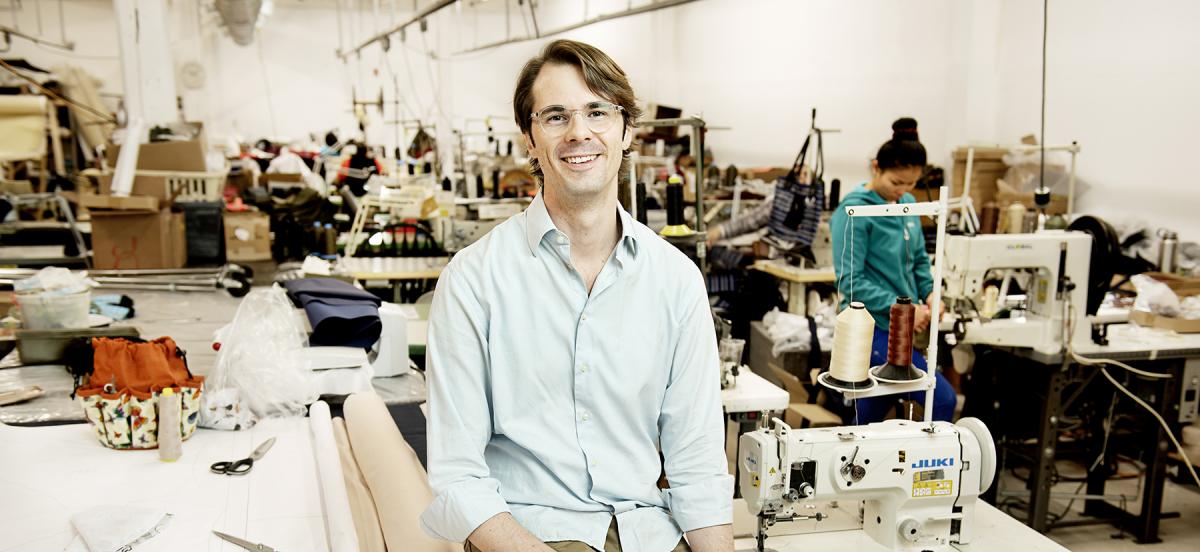"Fast Fashion" Alternative

Disturbed by how much castoff clothing goes into the trash stream, Griffin Vanze ’05 launched a company that makes womenswear out of recycled fabrics. Photo by Webb Chappell.
Details
Disturbed by how much castoff clothing goes into the trash stream, Griffin Vanze ’05 launched a company that makes womenswear out of recycled fabrics.
It was during a walk on a beach that Griffin Vanze ’05 first hatched his Big Sustainability Idea. But Vanze wasn’t gazing at the surf or sand when the notion popped up. Rather, he was looking at ... garbage.
Lots of it: cigarette butts, food wrappers, cans. Such items are the target of the Ocean Conservancy’s annual International Coastal Cleanup at hundreds of sites worldwide. Vanze, who worked in fundraising for the Conservancy from 2010 to 2015, participated in the environmental group’s trash pickup and data collection every September at beaches along the Atlantic and Pacific.
On this particular day, he was appalled not only by the volume of human carelessness, but also by something unexpected: the masses of clothing that had washed up. “I was really shocked at ... the concept that people viewed clothing as trash,” Vanze recalls.
There were T-shirts on the beach, he says. Perfectly good T-shirts. And jeans. And socks—lots of socks.
"There has to be better things to do than just throw them out,” Vanze thought at the time. “So, I started looking into how to recycle fabrics, and [researching] if there were even recycled fabrics available.”
That’s how he located RecoverTex, a company that makes clothing-grade yarn out of recycled poly cotton. The yarn-maker became Vanze’s early partner in Aeon Row, the Boston-based startup he founded in 2014, just before leaving Ocean Conservancy.
Today, Aeon Row is an e-commerce startup that has sold more than $15,000 worth of clothing and has helped to recycle more than 200 pounds of fabric. That amounts to a savings of 60,000 gallons of water, which is heavily used in fabric manufacturing, Vanze says.
Aeon Row offers its customers (women only, for now, though Vanze hopes to expand to menswear) fashionable, classic cotton skirts, dresses, and tops made of what Vanze calls “revived fabrics.” Ranging in price from $28 to $98, the garments, made from fabric knitted in Los Angeles, are manufactured in Lowell, Mass.
And customers can then send in their own old clothing—regardless of its source—for a 15 percent discount on their next order.
From the start, Vanze has bootstrapped his venture—no investors—and now operates his business out of his home in Quincy, Mass., with help and support from his “breadwinner” wife, Carmen Yeung, a government analyst.
That level of risk initially worried Mark Rubin ’05, Vanze’s senior year roommate and close friend. “To be honest, I thought he was crazy,” says Rubin. “The fashion world did not strike me as a world he would belong in.”
But Rubin gave Vanze’s plan a closer look and began to change his mind. “He shared with me some drawings he had sketched of what he wanted—dresses and tops. I was impressed.”
Rubin and his then-girlfriend, now-wife, Laine Henry, jumped in to help and advise. And, here, Vanze couldn’t have chosen better friends: Rubin is brand strategy director at Buzzfeed. Henry is a designer who’s contributed to prestigious fashion brands Tommy Hilfiger and Calvin Klein.
Henry designed Aeon Row’s “basics” women’s pieces, sewn from recycled fabrics and carefully crafted in a deliberate departure from the “fast-fashion” throwaway strategy of retailers such as H&M and Forever 21.
She also created mood boards, which summarize a fashion collection’s theme and can include swatches and sketches, and lent her expertise to production. Another Haverford grad, Jonas Clark ’04, co-owner of Tuckerman & Co., a maker of organic cotton dress shirts [Haverford fall 2015], offered financial guidance (e.g., steer clear of equity-eating investors).
Rubin, meanwhile, offered branding advice, as well as a free couch to sleep on during Vanze’s frequent visits to New York City’s fashion district. Rubin also helped win additional press for Aeon Row after Vanze’s initial success at gaining media attention from outlets such as The Huffington Post and Fast Company. The latter applauded Vanze’s sustainability effort, noting: “The average American throws out 70 pounds of clothing a year. Only 15 percent of that waste is recycled.”
The bulk, observed the magazine, is consigned to landfills, where it releases greenhouse gases, contributing to global warming.
The Fast Company article helped Aeon Row’s website traffic soar, from 1,000 monthly visitors to 8,000, and Vanze settled into the company-building phase he’s in today, shaped particularly by his two years in the Peace Corps in Namibia. There, he built classrooms and taught English. There, too, he appreciated the integration with nature he witnessed among his neighbors, who would set meetings by the sun’s position in the sky. That intense experience in turn led to his work with the Ocean Conservancy and fanned Vanze’s commitment to helping shape a better world. (“He was always a very socially conscious person,” Rubin observes.)
Asked about the constant bad news about climate change, Vanze’s comment is practical. “I think if you’re not depressed by it, you’re not paying attention,” he says. “[But] I think there’s resiliency. One of the things I learned from my experience in the Peace Corps was you can’t spend too much time worrying about what’s wrong. You’ve got to figure out solutions.”



